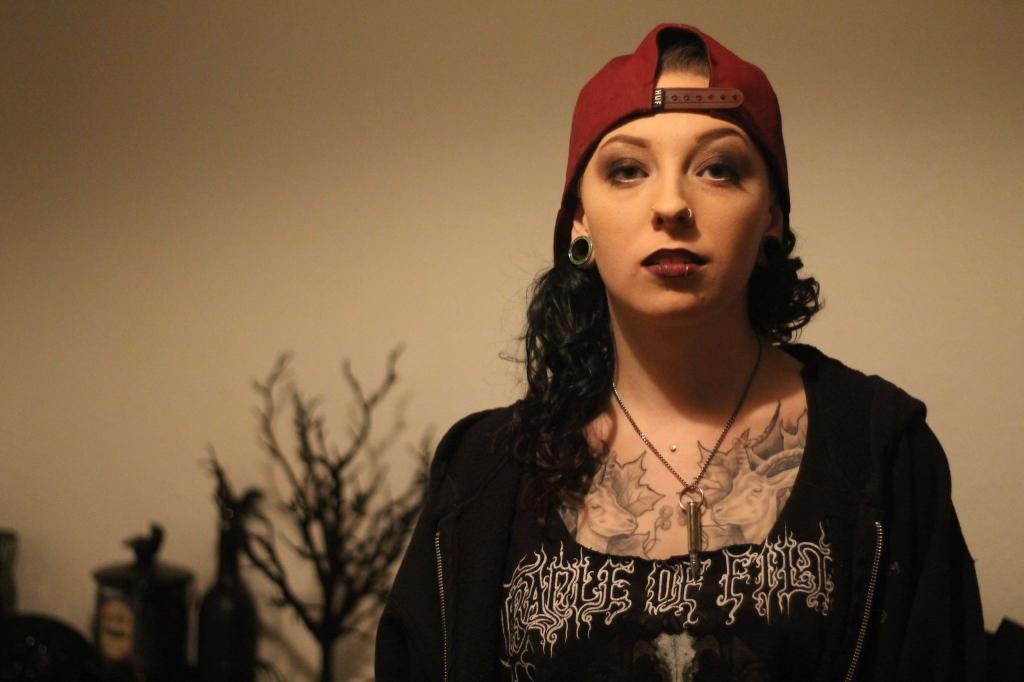By contributor Shanon Fenske
Meet Kyrsten Carlson: Musician, writer, autism paraprofessional, chef, dancer, and emcee; big hearted, quick-witted, wide smiling, and funny as hell—a confident, fun-loving spirit, pierced and tattooed, with a gorgeous smile and warm sparkling eyes.
Nine years ago, 15-year-old Kyrsten is at an all-ages music venue with trusted friends. Her closest girlfriend lures her into the washroom and away from her other friends. Kyrsten is offered a drink, which, being underaged, she accepts. A short while later, she starts to feel dizzy. The drink has been roofied with popular date-rape drug ketamine.
Four men enter, including the trusted female’s boyfriend who is believed to also be a friend of Kyrsten’s. Trusted female friend then exits the washroom and stands outside to keep guard. Kyrsten can barely move as her limbs begin to betray her. Her mind, however, is completely lucid. Following a one-sided struggle, the three men beat and rape Kyrsten so viciously she begins to hallucinate. The trusted female’s boyfriend watches the whole time, masturbating above her.
Kyrsten’s broken body is then tossed to the floor. The three men pay in drugs. The business transaction has come to an end. The men tell Kyrsten that if she ever speaks about the incident, she and her family will be murdered. Someone half dresses the 15-year-old girl. She has a broken rib, is bleeding from her head, and has suffered damage to her pelvis. It’s Kyrsten’s first sexual experience.
The incident was just the beginning of a torturous struggle Kyrsten now wants to share through a book she hopes to fund through the Not Your Fault campaign on GoFundMe. The crowd-funding project is designed to help her raise enough money so she can self-publish a memoir titled Ugly.
“I want to write about what it has been like to grow up in a culture of rape,” she says.
It’s Kyrsten’s first time at VIU, as we walk around the Nanaimo campus. She stops for several long moments in front of the École Polytechnique Massacre memorial and pays her respects. The memorial is a tribute to the 14 women murdered by a lone gunman in Montreal in 1989. He killed them because he saw them as feminists. Kyrsten appears reverent. We then walk to the theatre building where the interview officially begins.
“It wasn’t my choice to write this book,” Kyrsten says. “This book chose me.”
Kyrsten lived in Nanaimo until the age of eight and resides on Vancouver Island again now. Her family was living in Edmonton, Alberta, at the time of the assault.
Kyrsten says her response to being sold into rape was shame. Her instinct had been to hide the assault at first. “The first person I told was a health professional. She told me it was my fault.”
Victim blaming is sometimes referred to as “the second assault.” This is when the victim is believed to have partially consented to the attack by dressing a certain way, being intoxicated, using drugs at the time of the incident, or by having been at a vulnerable location or position in the first place. It’s a societal thing often connected to cultural or religious beliefs.
“The book will target survivors first and foremost,” Kyrsten says, “whether they’re in India or whether they’re here or anywhere. It will be a resource, because it’s not just about my story. It’s also going to be a book for people of loved ones who have experienced assault and trauma in their life—not particularly about how to take care of them, but through my experiences showing how I would like to be treated and how we look at culture. Some things need to change.”
Kyrsten says that most people have been very supportive about her speaking out, but she has experienced opposition as well. There have been Puritan comments from friends publically stating their disapproval on Facebook. One Twitter user asked, “What’s the money for? A mattress to carry around campus?” And there was another anonymous email warning her not to talk about the rape or there would be consequences. The email was reported to police and Kyrsten remained undeterred.
Nanaimo made national news several times between 2011 and 2013 for a series of date-rape druggings involving gamma-Hydroxybutyric acid (GHB). In 2011, a VIU student’s assault was covered in Maclean’s magazine, while another woman reported being drugged to CTV News. In November of 2013, Nanaimo RCMP warned the community to be cautious after five 19-year-old women came forward after being being drugged in nightclubs. None of the women reported being sexually assaulted. After the warning was issued, other women came forward as well. It’s likely there were many more who never did.
“We were quite lucky that so many people came forward,” says Constable O’Brien of the Nanaimo RCMP. “It happens in any community, even the tiniest.”
Constable O’Brien says that the reports “dropped off” after 2013, adding that less than 10 per cent of sexual assaults will ever be reported to police. Instead, people often report the assault to a health care worker or hospital staff. Police were looking at multiple “people of interest” in 2013, but no one was ever arrested or charged in connection to drugging.
It happens to men as well; men are more likely to be robbed than sexually assaulted, but that’s not always the case. In Kyrsten’s attack, the drug administrator was a trusted female friend who had separated her away from her other friends.
Part of her message is to make us think about the ideas we already tolerate. She does this by asking questions such as: Why do we live in a culture where someone who has been attacked feels ashamed? Shouldn’t the rapist be the one shamed? Many women—and men for that matter—don’t report rape because they believe people will think less of them.
According to Canadian statistics, only six out of 100 people reported being sexually assaulted, and only one to two per cent of date-rapes were reported. Data collected also indicated that one out of every four women in North America will be sexually assaulted in their lifetime, with 60 per cent of those being under the age of 17. Eleven per cent of them will sustain physical injuries. In 80 per cent of all cases, a friend or family member will have committed the rape.
Kyrsten says there are also attitudes around drinking that allows predator behaviours to be the norm—the age-old idea being that if you get someone drunk enough they won’t be able to make sound decisions leading to sex. Then there are those willing to speed up the process by drugging their target’s drink with ketamine or GHB so they can’t even fight back. In some cases, like Kyrsten’s, there will incomprehensibly still be a violent assault.
Kyrsten’s campaign logo is a jar with her severed head inside of it. The word “Ugly” is above her and there is a UPC symbol over her mouth. “Not For Sale” is painted on her neck.
When viewed for the first time, the black and white logo is somewhat disturbing. Kyrsten says the message is symbolically powerful, “Not only because it’s a females severed head in the jar, but also because that’s what we’re doing to people when we victim blame and perpetuate the violence. To me, it’s sort of the analogy of people sweeping it under the rug—except they hide it in a jar and put it on a shelf. They shut out and hide the problem instead of honouring dignity and basic human rights.”
Kyrsten’s story might not be one that people want to hear, but it’s one people really need to. Living in a society that shames rape survivors and wants them to stay silent is something that needs to be addressed, as is our socially tolerated attitudes around alcohol-facilitated rape.
Ugly will contain excerpts from Kyrsten’s private journals describing her personal struggles in the aftermath of the attack, the police report (with names of those under investigation blocked out), and will act as an access guide to support available for survivors of sexual assault. She also hopes the book will be educational for “loved ones of survivors” to better understand the hardships that survivors are struggling to overcome. Kyrsten believes that by sharing her experiences she’ll be able to illustrate that the post-trauma caused by the social stigma surrounding rape and other forms of sexual assault can be just as damaging as the initial attack itself.
Kyrsten says, the book is just the beginning of a larger campaign to raise awareness and to expose the shame
culture in which rape survivors are expected to recover in. Go to the Not Your Fault: the Ugly Campaign at on GoFundMe to show your support, share, or make a donation. You can find Kyrsten on Twitter @NotYourFaultCPG and Youtube.


